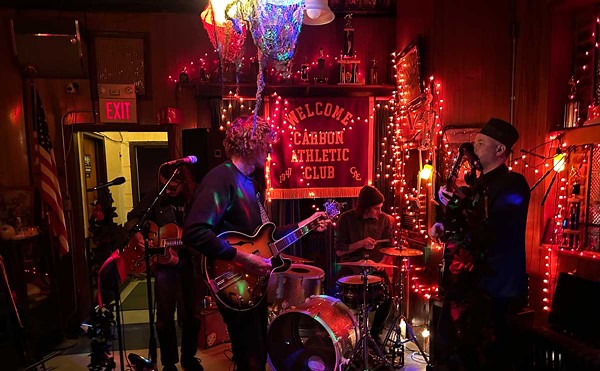I often live in a New Orleans state of mind. It's not that I have an endless Mardi Gras party bubbling in my brain, but my family hails from there and the cultural connections still reverberate through my life. A series of coincidences made those vibrations rumble louder as we neared the fourth anniversary of 2005's Hurricane Katrina.
While rummaging through books in my basement I came across a copy of Ishmael Reed's Shrovetide in Old New Orleans, and I enjoyed rereading the title essay about some of Reed's drunken deeds at Mardi Gras sometime around 1970. True to the spirit of carnival, he walked out of a party in a huff, having pissed off his friends, but couldn't remember where he'd parked his rented car.
About the same time I rediscovered the book, I got called to audition for the movie Little Murder; it's a mystery set in New Orleans post-Katrina, but it's being filmed in Detroit. I didn't get called back. I hear the film's producers plan to redo the interior of the Old Miami bar on Cass as the set for a New Orleans watering hole. I couldn't think of a better place to capture the essence of the Big Easy.
I was also recently called to lead a Second Line parade for a local man who wanted a traditional New Orleans-style funeral. Then I was contacted by Oxford University Press to review a book proposal about New Orleans musicians and the post-Katrina cultural scene.
I guess you can top it off with this Sunday's Lions game in New Orleans versus the Saints. Detroit against New Orleans on the gridiron, hmm, how else can the two cities compete? I've heard both places mentioned as economic ground zero during our current recession: New Orleans because of the flooding and devastation from Katrina; Detroit because of our dependency on the struggling auto industry. Ground zero refers to the point of impact taking the most damage where a bomb detonated.
It would seem that a bomb was dropped on both cities when you look at the number of abandoned, falling-apart buildings and vacant lots each one has. Although a smaller city, 2008 postal records show New Orleans with 71,657 residential addresses that were vacant, while Detroit had about 63,211 within its borders. With New Orleans growing and Detroit shrinking we're probably closer to even on that count. That's a toss up on the ground-zero meter.
The contrast of New Orleans and Detroit is big from a population standpoint. The seven-parish greater New Orleans area has a population of about 1.3 million. In fact, U.S. Census numbers show the entire state of Louisiana to have a smaller population (4.4 million) than the nine-county Metro Detroit area (5.4 million).
Still both cities have suffered eye-popping population losses — though New Orleans has bounced back from its low point. The Crescent City lost about 60 percent of its 455,000 population in the wake of Katrina, which cut its residents to something like 180,000. But a March census report put the New Orleans population back above 300,000 for the first time since Katrina.
Detroit has endured steady population drain since 1950, from 1.9 million then to about 850,000 today. A report from the Southeast Michigan Council of Governments shows a Detroit population drop of about 81,000 from 2008 to 2009 alone.
Folks seem to be flocking back to New Orleans while Detroit is still bleeding people. Another point for Detroit on the ground-zero meter.
Political and police corruption fit like an old worn pair of jeans in Louisiana. Remember U.S. Rep. William Jefferson and the $90,000 cash stashed in his freezer? Federal jurors found Jefferson guilty of accepting bribes last month. The New Orleans police department has a recent history of officers being busted for plotting a bank robbery and taking bribes, even an officer on death row for murder; 15 percent of NOLA police officers were fired due to desertion during Katrina. That's all par for the course there. A 2007 analysis of Justice Department data on public corruption convictions by Corporate Crime Reporter, a weekly legal newsletter, found Louisiana the most corrupt state per capita in the nation. Michigan came in 20th in this analysis of the 35 most populous states.
Although Louisiana and New Orleans have a longer and more flamboyant history of corruption, Detroit has been working hard to catch up. Former police chief William Hart's 1992 conviction for embezzling $2.6 million from city coffers (much of which went to his three mistresses) was worthy of former Louisiana Gov. Earl Long (and stripper-mistress Blaze Starr). And we haven't seen the end of Kwame Kilpatrick's debacles – including the various satellite cronies orbiting the main mass.
Most recently, revelations about Sheryl Robinson Wood, federal monitor of the police department consent decree, and her relationship with Kilpatrick have dragged us deeper into the muck. As Mayor Dave Bing recently told the Freep regarding the difficulty of luring businesses here, "There is a perception ... that Detroit politicians are corrupt."
Give us a half-a-point for crookedness on the ground-zero meter.
New Orleans is known for music, food, Mardi Gras, architecture, Creoles, Cajuns and at least three languages in use. Those are all things the city can easily reclaim post-Katrina, especially because the people of New Orleans are known for wanting to stay in New Orleans. It's hard to move them out despite regular acts of God that literally blow them away. On the other hand Detroit is known for cars and a failing auto industry, Motown music and Vernor's ginger ale. Much of the population migrated here for auto industry jobs, but we're fickle; give us a reason to move on and we'll go.
Let's get to the nitty-gritty here – the statistics that really go to quality of life in these cities. New Orleans' murder rate is the nation's highest, with 64.7 per 100,000 people, while Detroit comes in at 40.7 per 100,000. Score one for New Orleans on the ground-zero meter. Unemployment brings out the best in Detroit: Our rate for July is triple the national average at 28.9 percent. New Orleans came out better with an 8.1 percent unemployment rate. The ground-zero meter points to Detroit on this one. Detroit scores again on poverty: in 2007, the most recent figures tabulated for comparison on the Health and Human Services website, Detroit reached 33.8 percent while the New Orleans level was 20.6 percent.
And let's throw a point to Detroit because last year, when the National Conference of Black Mayors decided not to convene convention in Detroit, they took it to New Orleans.
It looks like an overwhelming victory for Detroit's claims for economic ground-zero status. While there is still terrible devastation remaining from Hurricane Katrina, the New Orleans economy is beginning to recoup. As they rebuild there, people are talking about making it a green, sustainable city. There are Detroiters with similar visions, but I think Detroit has yet to hit the bottom. New Orleans has. This is certainly no scientific assessment. Both cities have their claims to being ground zero, but I think Detroit is in a deeper impact crater at this point.
While manufacturing jobs head to cheaper labor countries, New Orleans cannot be outsourced. Every fake Bourbon Street gin mill and French Quarter-themed café around the world depends on the rooted authenticity that can still be found on a visit to the Big Easy.
Can I get a fried oyster po' boy?
Larry Gabriel is a writer, musician and former editor of Metro Times. Contact him at [email protected]





